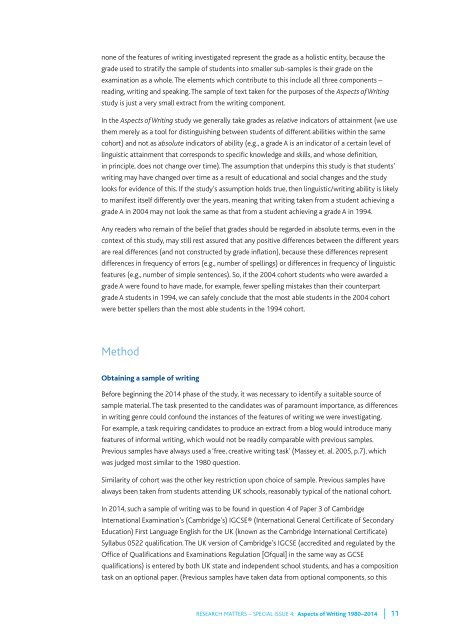Research Matters
N6fqJH
N6fqJH
You also want an ePaper? Increase the reach of your titles
YUMPU automatically turns print PDFs into web optimized ePapers that Google loves.
none of the features of writing investigated represent the grade as a holistic entity, because the<br />
grade used to stratify the sample of students into smaller sub-samples is their grade on the<br />
examination as a whole.The elements which contribute to this include all three components –<br />
reading, writing and speaking.The sample of text taken for the purposes of the Aspects of Writing<br />
study is just a very small extract from the writing component.<br />
In the Aspects of Writing study we generally take grades as relative indicators of attainment (we use<br />
them merely as a tool for distinguishing between students of different abilities within the same<br />
cohort) and not as absolute indicators of ability (e.g., a grade A is an indicator of a certain level of<br />
linguistic attainment that corresponds to specific knowledge and skills, and whose definition,<br />
in principle, does not change over time).The assumption that underpins this study is that students’<br />
writing may have changed over time as a result of educational and social changes and the study<br />
looks for evidence of this. If the study’s assumption holds true, then linguistic/writing ability is likely<br />
to manifest itself differently over the years, meaning that writing taken from a student achieving a<br />
grade A in 2004 may not look the same as that from a student achieving a grade A in 1994.<br />
Any readers who remain of the belief that grades should be regarded in absolute terms, even in the<br />
context of this study, may still rest assured that any positive differences between the different years<br />
are real differences (and not constructed by grade inflation), because these differences represent<br />
differences in frequency of errors (e.g., number of spellings) or differences in frequency of linguistic<br />
features (e.g., number of simple sentences). So, if the 2004 cohort students who were awarded a<br />
grade A were found to have made, for example, fewer spelling mistakes than their counterpart<br />
grade A students in 1994, we can safely conclude that the most able students in the 2004 cohort<br />
were better spellers than the most able students in the 1994 cohort.<br />
Method<br />
Obtaining a sample of writing<br />
Before beginning the 2014 phase of the study, it was necessary to identify a suitable source of<br />
sample material.The task presented to the candidates was of paramount importance, as differences<br />
in writing genre could confound the instances of the features of writing we were investigating.<br />
For example, a task requiring candidates to produce an extract from a blog would introduce many<br />
features of informal writing, which would not be readily comparable with previous samples.<br />
Previous samples have always used a ‘free, creative writing task’ (Massey et. al. 2005, p.7), which<br />
was judged most similar to the 1980 question.<br />
Similarity of cohort was the other key restriction upon choice of sample. Previous samples have<br />
always been taken from students attending UK schools, reasonably typical of the national cohort.<br />
In 2014, such a sample of writing was to be found in question 4 of Paper 3 of Cambridge<br />
International Examination’s (Cambridge’s) IGCSE® (International General Certificate of Secondary<br />
Education) First Language English for the UK (known as the Cambridge International Certificate)<br />
Syllabus 0522 qualification.The UK version of Cambridge’s IGCSE (accredited and regulated by the<br />
Office of Qualifications and Examinations Regulation [Ofqual] in the same way as GCSE<br />
qualifications) is entered by both UK state and independent school students, and has a composition<br />
task on an optional paper. (Previous samples have taken data from optional components, so this<br />
RESEARCH MATTERS – SPECIAL ISSUE 4: Aspects of Writing 1980–2014 | 11


